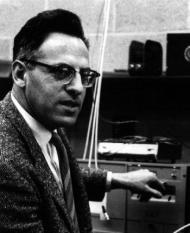Frederick Reines (March 16, 1918 – August 26, 1998) was an American physicist. He was awarded the 1995 Nobel Prize in Physics for his co-detection of the neutrino with Clyde Cowan in the neutrino experiment, and may be the only scientist in history "so intimately associated with the discovery of an elementary particle and the subsequent thorough investigation of its fundamental properties".
Early Life
Reines was born in Paterson, New Jersey, the son of Gussie (Cohen) and Israel Reines, Jewish emigrants to the US from Russia. He is a paternal relative of the Rabbi Yitzchak Yaacov Reines, and the youngest of four children. Reines and his family moved to upstate New York, where he spent much of his childhood in a small town where his father ran a country store. Looking back, Reines said: "My early childhood memories center around this typical American country store and life in a small American town, including fourth of July celebrations marked by fireworks and patriotic music played from a pavilion bandstand."
Reines was an Eagle Scout, and also participated in singing in a chorus, performing solo roles in pieces, including Händel's Messiah. He was encouraged to take lessons with a well-known voice coach at the Metropolitan Opera, where they were provided for him free of charge, since he could not afford to pay for them.
Reines later lived in North Bergen, New Jersey, residing on Kennedy Boulevard and 57th Street. Because North Bergen did not have a high school for its residents during Reines' youth, he attended Union Hill High School (what is today Union Hill Middle School) in Union Hill, New Jersey (what is today Union City, New Jersey). He graduated from Union Hill in 1935.
Reines had a passion for creating and building things, and exhibited a love of science in his childhood. In his autobiography given to the Nobel Prize Committee, he recalled, "The first stirrings of interest in science that I remember occurred during a moment of boredom at religious school, when, looking out of the window at twilight through a hand curled to simulate a telescope, I noticed something peculiar about the light; it was the phenomenon of diffraction. That began for me a fascination with light." Ironically, Reines’ excelled in literary and history courses, but received average or low marks in science and math in his freshman year of high school, though he improved in those areas by his junior and senior years through the encouragement of an unidentified teacher who gave him a key to the school laboratory and gave him permission to work whenever he wanted. This cultivated a love of science in Reines by his senior year, and led him in the direction of a career in science. In response to a question seniors were asked for a yearbook quote, Reines responded, "To be a physicist extraordinaire." Reines graduated from high school in 1935. Reines said that his "early education was strongly influenced" by his older siblings. They were studious pupils who became doctors and lawyers.
Between college and graduate school, Reines briefly considered pursuing a professional singing career, but ultimately decided against it.
Reines attended Stevens Institute of Technology in Hoboken, where he earned his M.E. and M.S. degrees, before receiving his Ph.D. from New York University.
Discovery of the neutrino and the inner workings of stars
In 1944 Reines began working under Richard Feynman in the Theoretical Division of the Los Alamos National Laboratory, where Reines became a group leader in 1945. In the early 1950s, working in Hanford and Savannah River laboratories, Reines and his colleague, Clyde Cowan developed the detection procedures by which they and a team of researchers in 1956 first detected neutrinos. Neutrinos had been first proposed theoretically by Wolfgang Pauli 20 years earlier to explain undetected energy that escaped when a neutron decayed into a proton and an electron. From then on Reines dedicated the major part of his career to the study of the neutrino’s properties and interactions, which work would influence study of the neutrino for future researchers to come, including the discovery of neutrinos emitted from Supernova SN1987A by the Irvine-Michigan-Brookhaven Collaboration. This discovery helped to inaugurate the field of neutrino astronomy.
On the basis of his work in first detecting the neutrino, Reines became the head of the physics department of Case Western Reserve University from 1959 to 1966. At Case, Reines led a group that was the first to detect neutrinos created in the atmosphere by cosmic rays. Reines had a booming voice, and had been a singer since childhood. During this time, besides performing his duties as a research supervisor and chairman of the physics department, Reines sang in the Cleveland Orchestra Chorus under the direction of Robert Shaw in performances with George Szell and the Cleveland Orchestra.
In 1966, Reines took most of his neutrino research team with him when he left for California to become the founding dean of physical sciences at the then new University of California, Irvine (UCI). While at UCI, Reines extended the research interests of some of his graduate students into the development of medical radiation detectors, such as for measuring total radiation delivered to the whole human body in radiation therapy.
Reines had prepared for the possibility of measuring the distant events of a supernova explosion. Supernova explosions are rare, but Reines thought he might be lucky enough to see one in his lifetime, and be able to catch the neutrinos streaming from it in his specially-designed detectors. According to a UCI obituary, during his wait for a supernova to explode, he put signs on some of his large neutrino detectors, calling them "Supernova Early Warning Systems".
In 1995, Reines was honored, along with Martin L. Perl with the Nobel Prize in Physics, and his work with Clyde Cowan in first detecting the neutrino was recognized by the National Academy of Sciences. Reines also received many other awards, including the National Medal of Science.
Reines remained on UCI's faculty until his death.

